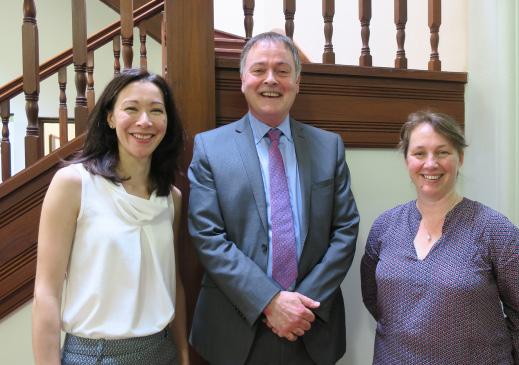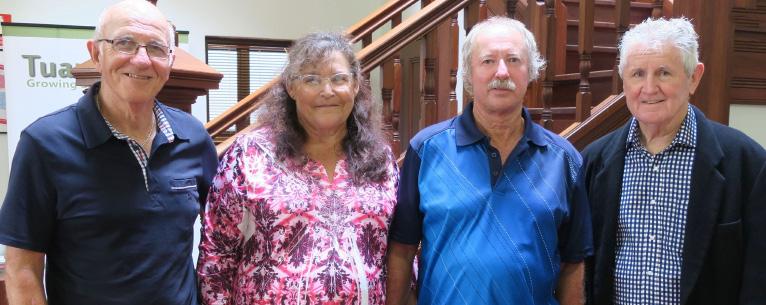
7 minute read
News for former child migrants
Joan Kerry was a very welcome visitor when she called by in April this year during a trip abroad from England with her husband Nigel.
Joan was Project Manager of the Australian Child Migrant Project and is well known to many UK former child migrants for her family tracing and reunification work.
Advertisement
Joan said she was really pleased to catch up with some of the people she had worked with and see how their lives have changed over the years. Dennis McNerney is one of the many former child migrants for whom Joan located family and assisted with reunification. Dennis writes:
“I first met Joan early in 2005 at the CBERS office, which at that time was in Subiaco. Pip had just started working there, and observed my meeting with Joan.
Joan had access to my records from Father Hudson’s Homes, the former orphanage near Birmingham in England, and home to me for the first seven years of my life, before sailing to Fremantle in January 1955.
Once back in the UK, Joan worked tirelessly to locate my mother’s family (four brothers and six sisters) who I met for the first time in August 2005, when I travelled to England to celebrate my mother’s 80th birthday.
Joan has had a huge impact in my life and without Joan’s connection I would be still be experiencing the
‘unknown factor’.
My goal of finding family is gaining further pace with the discovery of my father’s family 12 months ago. This part of the journey has been greatly assisted by Lesley Silvester of the WA Genealogical Society.
My wife Nicky and I will be travelling to Europe in August 2019 with the specific aim of consolidating my father’s side of the family. The main highlight will be meeting my father’s daughter for the first time in Portugal”.
Survivors and advocates have successfully lobbied for improvements to proposed legislation on redress in Northern Ireland, including an increase in the minimum payment from UK£7,500 to UK£10,000. Pressure is also building for a redress scheme to be established without further delay.
Survivors have been frustrated by a lack of progress since the NI Government collapsed in March 2017, shortly after the Historical Institutional Abuse Inquiry (HIAI) published its recommendations.
In a letter of 23 July 2019, NI Secretary of State Karen Bradley advised of the UK Government’s ‘clear commitment’ to introduce redress legislation by the end of the year, should the NI Government not be restored by that time.
On 2 July 2019, an Interim Advocate for Survivors of Institutional Childhood Abuse was appointed, and will act as a ‘voice for victims and survivors’ until a statutory Commissioner is established, in line with HIAI recommendations.
We are grateful to Prof Patricia Lundy and Gerry McCann, Chair of the Rosetta Trust survivors’ group in Belfast, for keeping us informed of developments.
Although former child migrants comprised 12% of witnesses in the HIA Inquiry, they were not consulted about redress until links were established between Tuart Place and the survivor-led ‘Panel of Experts on Redress’ in Northern Ireland. Since then, former child migrants have played an active role in the ongoing consultations and surveys on redress. 10
News from Northern Ireland
In October 2018, FACT Board member and former child migrant Ann McVeigh met with Gerry and Patricia in Belfast to receive a briefing on the proposed redress legislation, and to provide feedback from Australia.
British ex-gratia update
Applications to the British Government ex-gratia scheme for former child migrants from the UK will remain open until the end of 2020.
Former child migrants from England, Wales, Northern Ireland and Scotland who travelled unaccompanied to Australia under government schemes are eligible for the flat-rate ‘common experience’ payment of UK£20,000. For further information, see https://www. childmigrantstrust.com/news or contact the Child Migrants Trust on Freecall 1800 040 509.

Scotland is standing head and shoulders above other countries in their approach to redressing historic institutional child abuse and neglect.
The Scottish Government’s unreserved public apology to survivors in October 2018 was delivered alongside news of an Advance Payment Scheme, which opened on 29 April 2019.
The scheme has a simple application process and is providing flat-rate interim payments of UK£10,000 to those who were abused or neglected in care in Scotland and who are terminally ill or aged 70 or over. A full redress scheme is expected to be in place by March 2021.
Additionally, a support service, Future Pathways, has been made available to Scottish survivors (including child migrants), offering a range of tangible and useful options – such as funding for health and wellbeing activities and the purchase of one-off items.
We are currently assisting Scottish former child migrants to apply for both the UK£10,000 advance payment and benefits through Future Pathways. Examples of support received so far include payment of vet bills, purchase of computers, white goods and appliances, home improvements and travel vouchers to help achieve a better quality of life.
Meanwhile, the Scottish Child Abuse Inquiry (SCAI) continues to gather evidence from witnesses and review existing data and research findings.
We were pleased to welcome the SCAI team back to Tuart Place in March 2019 to conduct further private hearings with Scottish migrants.
It was also nice to see Professor Andy Kendrick of Strathclyde University at the SHCY conference in Sydney in June 2019, where Andy gave a presentation on the development and operation of the Scottish Inquiry.
You can find further information on the Inquiry, Future Pathways and the Scottish Advance Payment Scheme on their respective websites, or from Tuart Place. SCAI team members (L-R) Andrea, Duncan and Jacqui at Tuart Place in March 2019
Following dad’s footsteps...
We were delighted to welcome Maxine and Greg Dyson to Tuart Place in April this year.
Maxine is the daughter of Ian ‘Scotty’ Hoban, a Scottish former child migrant who came out on the Strathnaver in 1939, and lived at Tardun and Clontarf. Scotty is now 90 years old and lives in NSW.
Maxine says her dad is very active – plays golf every Monday, is a member of the choir, curator of the church, and loves walking his fox terrier Digger. He is known as Speedy Gonzales on his gopher. Maxine and Greg really enjoyed their visit to Tuart Place especially as it gave them a chance to talk to Clontarf Old Boys and look through photo albums. They also got up-to-date information on the various forms of assistance

available to Scottish former child migrants. Greg described their visit as “overwhelmingly good”.
During their visit to WA, Maxine and Greg also visited both Clontarf and Tardun. They particularly appreciated the time that caretaker Percy Faulkner spent showing them around the Tardun property.
Our photo shows Clontarf Old Boys Dennis McNerney (on left) and Kevin Collins (on right) welcoming Maxine and Greg to Tuart Place.
Thank you Paddy Cannon!
Thank you Paddy Cannon for your tireless work supporting survivors of past institutional care.
You began your work well before any of the services operating today, and over the years you have helped countless people in need. You are an inspiration to us all.
Catriona Milne, Manager of the Uniting Heritage Service in Melbourne, visited Tuart Place in June this year and spent time talking with participants and staff.
During her visit Catriona gave us an update on her work in Victoria.
The Uniting Heritage Service exists to support past residents (and their families) of the former Methodist, Presbyterian and Uniting Church Children’s Homes and foster care. They provide access to records, photos and historical material, organise reunions and help to locate significant people.
The Heritage Service is undertaking projects to improve access to historic records and photographs. For more information, visit https://www.vt.uniting. org/services/child-youth-family/unitingheritage-service/

Kevin Donaghy and Rob Eddy with Catriona at Tuart Place
Historic photo of Tally Ho Boys Village Victoria from the Uniting Heritage collection

Records from the former Pallottine Mission School at Tardun
AIATSIS - the Australian Institute for Aboriginal and Torres Strait Islander Studies - received a donation of records from the WA Pallottine Mission in 2017.
The records relate to Aboriginal language work undertaken by the Pallottines and student records from the Tardun school, run by the Mission from 1948 to 2004.
AIATSIS arranged and described the Tardun school records as a priority, in anticipation of access requests following the Royal Commission into Institutional Responses to Child Sexual Abuse.
There are nearly 1600 files in this record group, containing administrative information relating to individual children who attended the school.
Anyone who attended school at the Pallottine Mission at Tardun can request a copy of their records by emailing the AIATSIS Collections Access Unit: collectionenquiry@aiatsis.gov.au . 12

The contents of these files are only available to the people who have records in the collection, their nominated delegate, or a family member.
General information about the collection is available at https://aiatsis.gov.au/sites/default/files/ catalogue_resources/ms_5150_tardun_web.pdf
The records donated to AIATSIS include a large number of photographs, which are currently being catalogued. AIATSIS will advise when they are available for access.
Information submitted by Fiona Blackburn, Senior Archivist, Print and Manuscript Collection, AIATSIS, Canberra, ACT.










